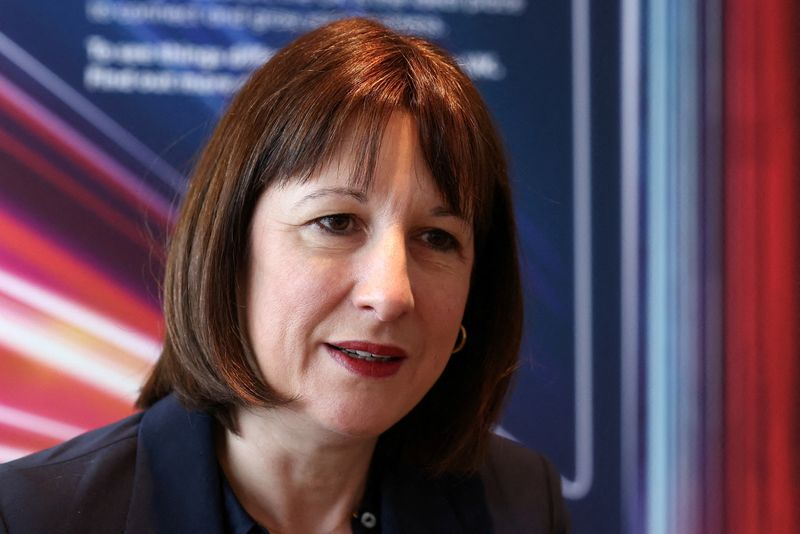By Paul Sandle, Kate Holton and Andres Gonzalez
LONDON (Reuters) - Britain's choice of a former Amazon (NASDAQ:AMZN) executive to chair its antitrust regulator is a clear pitch for investment, including from Big Tech, and signals it is prepared to go easier on deal-making if that would help, company bosses and lawyers said.
Doug Gurr, former boss of the U.S. online retailer's UK operation, was picked to chair the Competition and Markets Authority (CMA) after Marcus Bokkerink recognised "it was time to move on", finance minister Rachel Reeves said on Wednesday.
With the economy struggling and pressure building on the government to improve living standards, Reeves wants regulators to change, believing they have become too risk-averse and are preventing companies from innovating and expanding.
Cristina Caffarra, a competition economist who has provided expert analysis for court cases, said mergers did not increase economic output unless big synergies were reinvested.
But the selection of Gurr as chair - on an interim basis for now - indicated Britain was moving closer to U.S. regulation in the hope it would attract investment.
"This is the significance of it," she said.
Competition lawyer Dominic Long at A&O Shearman said there could be an increase in cross-border deals for UK assets.
"All things being equal, it will be easier to get potentially problematic deals through now than it would have been, say, 12 months ago," he said.
Foreign investment is important in Britain, with the government estimating it created more than 70,000 jobs in fiscal 2023/24. Projects fell after Britain's 2016 vote to leave the European Union, but the country remains close to France as the top European destination.
However, successive governments have faced criticism from unions and some politicians for making it too easy for foreign companies to buy British ones.
BRUISING ENCOUNTER
The CMA had already made changes under Bokkerink after it took on Microsoft (NASDAQ:MSFT) in 2023 only to back down.
It was the only major regulator to block the U.S. tech firm's $69 billion takeover of "Call of Duty" maker Activision Blizzard (NASDAQ:ATVI).
But it reversed its decision after a furious Microsoft lobbied the government. The CMA said the U-turn had not been politically influenced. It did not block any big deals in 2024.
One FTSE-100 chief executive, who asked not to be named, said Britain's new Labour government was trying to rebuild ties with Big Tech after the bruising Microsoft encounter.
He said with Donald Trump's new U.S. administration set to give greater leeway to the likes of Meta (NASDAQ:META), Apple (NASDAQ:AAPL), Microsoft, Google (NASDAQ:GOOGL) and Nvidia (NASDAQ:NVDA), Britain realised it needed to follow suit.
"Given the way the world is going in terms of size and scale of business, we maybe need to look at things in a somewhat different way in the UK," he said.
"There's probably a recognition that having more scale is a good thing."
Martin Sorrell, CEO of ad group S4 Capital and founder of WPP (LON:WPP), said the talk at the World Economic Forum in Davos was that Britain - and Europe - had become overly regulated. "Maybe this is a welcome change in the UK," he told Reuters.
TOP TIER
The CMA moved into the top tier of regulators when Britain left the EU in 2020, forcing it to decide whether to align with Brussels, which has issued antitrust charges against Microsoft, Apple and others, or take an often lighter U.S. approach.
Bokkerink said on LinkedIn he had tried to give consumers choice and enable businesses to compete on merit.
Reeves said in Davos on Wednesday that the balance had moved too far on regulating risk.
"You've got to be able to protect consumers but people should also be able to take risks," she said.
While the CMA said last year it would focus on "truly problematic mergers" and be more open to solutions, it has also stepped up its scrutiny of technology companies in general.
Its Digital Markets Unit is using powers granted this month to investigate Google's search business and on Thursday it launched an investigation into Apple and Google's smartphone operating systems, app stores and browsers.
The CMA is also investigating cloud services from Amazon, Microsoft and Google.
Google echoed the government's growth mantra in its defence of its search business, saying digital services like search would "power new economic development" in Britain.
The government denied it was pandering to Big Tech.
"I don't think the characterisation of us being in the pocket of Big Tech is at all accurate," Justin Madders, a junior minister in the business department, told parliament on Wednesday.
Amelia Fletcher, professor of competition policy at Norwich Business School and a former non-executive director of the CMA, said she would be "very concerned" if the government weakened the CMA's ability to regulate digital markets.
"I fear that Big Tech is framing this new regulation as anti-growth, when it is specifically designed to promote growth," she said.

"It is designed to open up markets to new competition and innovation, and to ensure that businesses using digital platforms can compete effectively.
"I would urge the CMA to remain firm."